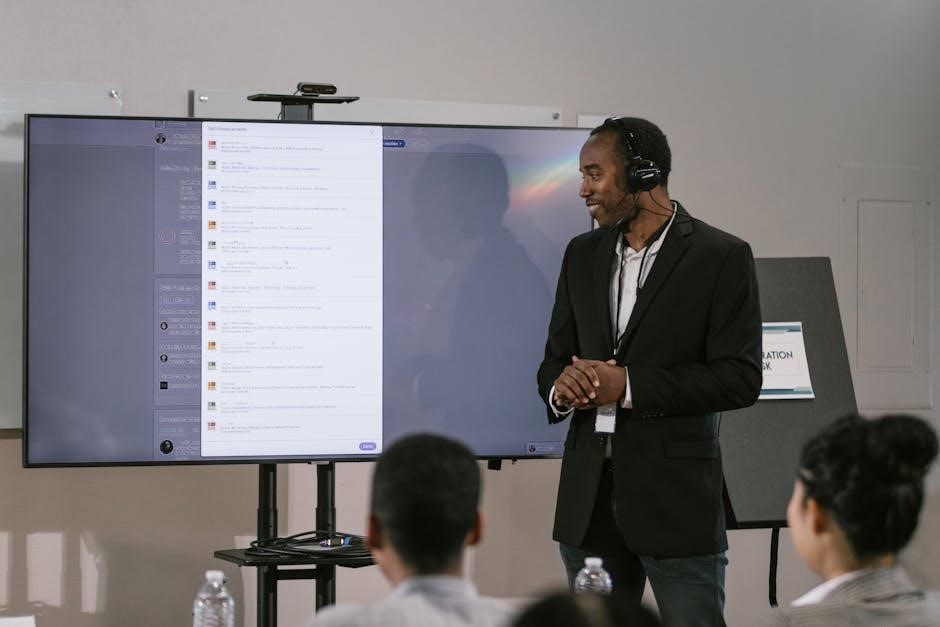An Enduring Power of Guardianship (EPG) is a legal document allowing you to appoint a trusted person to make personal, lifestyle, and treatment decisions on your behalf if you lose capacity. It ensures your autonomy and well-being are protected, providing peace of mind for the future.
1.1 Definition and Purpose
An Enduring Power of Guardianship (EPG) is a legal document that enables individuals to appoint a trusted person to make personal, lifestyle, and treatment decisions on their behalf. Its purpose is to ensure that your autonomy and well-being are safeguarded if you become unable to make decisions independently. It only takes effect when you lose capacity, providing a clear framework for your care and preferences.
1.2 Legal Framework in Western Australia
In Western Australia, the Enduring Power of Guardianship is governed by the Guardianship and Administration Act 1990. The document must comply with Schedule 1 of the Guardianship and Administration Regulations 2005. The Public Advocate oversees the process, ensuring that the rights and interests of individuals are protected. The form must be properly witnessed, typically by two independent individuals, one of whom may be a Justice of the Peace or lawyer.

Legal Requirements for the EPG Form
The EPG form must comply with Schedule 1 of the Guardianship and Administration Regulations 2005. It must be completed in the prescribed format, signed, and properly witnessed to be legally valid.
2.1 Format and Compliance with Regulations
The EPG form must comply with Schedule 1 of the Guardianship and Administration Regulations 2005. It must be in the prescribed format or substantially similar to ensure legal validity. The form is available from the Office of the Public Advocate and must be properly completed, signed, and witnessed by two independent individuals, one of whom should be authorized to witness statutory declarations. Proper witnessing ensures the document’s legality and enforceability under Western Australian law.
2.2 Witnessing and Signing Requirements
The EPG form must be signed by you and your chosen guardian(s) in the presence of two independent witnesses. One witness must be authorized to witness statutory declarations, such as a Justice of the Peace, lawyer, or medical professional. Your signature must be witnessed, and the guardian’s acceptance section must also be signed and witnessed. This ensures the document’s validity and compliance with legal standards in Western Australia.

Eligibility to Create an EPG
To create an EPG, you must be at least 18 years old and have the mental capacity to make informed decisions. This ensures you understand the document’s implications and can appoint a guardian willingly.
3.1 Age and Capacity Requirements
To create an EPG, you must be at least 18 years old and possess the mental capacity to make informed decisions. Capacity requires understanding the document’s nature, its implications, and the ability to make reasoned decisions. You must be able to communicate your choices, even if through assistive means, ensuring you fully comprehend the authority granted to your enduring guardian.
3.2 Mental Capacity and Legal Competence
Mental capacity is a critical requirement for creating an EPG. You must have the ability to understand the nature and implications of the document and make reasoned decisions. Legal competence ensures you can communicate your choices, even with assistance. The EPG only becomes effective if you lose capacity, safeguarding your autonomy while ensuring decisions align with your best interests and preferences.
Process of Creating an EPG
Mental capacity and legal competence are essential for creating an EPG. You must fully understand the document’s implications and make reasoned decisions. This ensures the EPG reflects your genuine wishes and safeguards your autonomy when capacity is lost, aligning decisions with your best interests and preferences.
4.1 Steps to Complete the Form
To complete the Enduring Power of Guardianship form, start by obtaining the official form from a reliable source, such as the Office of the Public Advocate. Carefully fill in your personal details and those of your chosen guardian. Specify the scope of authority, ensuring it aligns with your wishes for personal, lifestyle, and medical decisions. Both you and your guardian must sign the form in the presence of two independent witnesses, one of whom should be authorized to witness statutory declarations. Initial each page to confirm you have read and understood the content. Finally, ensure the form is dated and stored securely, with copies provided to your guardian and relevant parties.
4.2 Role of Witnesses and Signatories
Witnesses play a crucial role in validating the Enduring Power of Guardianship form. Two independent witnesses are required, one of whom must be authorized to witness statutory declarations, such as a Justice of the Peace or lawyer. The donor and guardian must sign the form in each other’s presence, with witnesses attesting to the signatures. This ensures the document’s legal validity and confirms that both parties entered the agreement willingly and with full understanding.
Key Features and Benefits of an EPG
An EPG protects your autonomy by allowing a trusted guardian to make personal, lifestyle, and treatment decisions on your behalf, ensuring your wishes are respected.
5.1 Scope of Authority for the Guardian
The enduring guardian has the authority to make decisions about personal, lifestyle, and treatment matters, such as where you live, healthcare, and daily activities, ensuring your best interests are prioritized while respecting your wishes as outlined in the document.
5.2 Protection of Personal and Lifestyle Decisions
An EPG safeguards your personal and lifestyle preferences, ensuring decisions align with your wishes. It protects your autonomy by allowing your chosen guardian to make choices about healthcare, living arrangements, and daily activities, maintaining your quality of life and respecting your values when you cannot make decisions yourself.

Differences Between EPG and Enduring Power of Attorney (EPA)
An EPG focuses on personal, lifestyle, and treatment decisions, while an EPA manages financial and property matters. They serve distinct purposes but can complement each other.
6.1 Purpose and Scope of Each Document
An EPG allows appointment of a guardian for personal, lifestyle, and treatment decisions, effective when the donor loses capacity. An EPA, however, is for managing financial and property matters. While both are legal tools for future planning, their scopes differ: EPG focuses on personal care, whereas EPA handles financial affairs, ensuring comprehensive coverage of a person’s needs.
6.2 Limitations of EPG in Financial Matters
An EPG does not grant authority to manage financial or property matters, such as banking, investments, or real estate transactions. For financial management, a separate Enduring Power of Attorney (EPA) is required. This distinction ensures that personal care and financial decisions are addressed through appropriate legal documents, preventing overlap and potential conflicts in authority.
Role and Responsibilities of the Enduring Guardian
The enduring guardian is responsible for making personal, lifestyle, and treatment decisions on behalf of the donor when they lack capacity. The guardian must act in the donor’s best interests, ensuring their autonomy and well-being are respected and protected.
7.1 Types of Decisions the Guardian Can Make
The enduring guardian can make decisions about personal matters, such as accommodation, healthcare, and lifestyle choices. They can also make treatment decisions, ensuring the donor receives appropriate medical care. The guardian’s authority extends to accessing support services and managing daily activities, but they cannot make financial or property decisions, as these fall under the Enduring Power of Attorney (EPA).
7.2 Duties and Limitations of the Guardian
The guardian must act in the donor’s best interests, respecting their wishes and values. They are responsible for making decisions about personal care, health, and lifestyle but cannot manage financial or property matters. The guardian’s authority is limited to the scope defined in the EPG and only applies when the donor lacks capacity to decide for themselves.

Revocation of an EPG
Revocation of an EPG is straightforward. You or your guardian can revoke the document by informing the guardian and relevant authorities in writing. The same process applies if the guardian wishes to revoke their appointment.
8.1 Grounds for Revocation
An EPG can be revoked if the donor has the capacity to make the decision or if the guardian resigns. Courts may also revoke it due to misconduct or incapacity of the guardian. Additionally, mutual agreement between the donor and guardian can lead to revocation, ensuring the document remains aligned with the donor’s wishes and circumstances.
8.2 Process of Revoking the EPG
To revoke an EPG, the donor must inform the guardian and relevant authorities in writing. If the donor lacks capacity, the guardian can resign by notifying the donor or authorities. The revocation becomes effective once all parties are informed. Legal advice is recommended to ensure the process is followed correctly, especially in contested cases, which may require court intervention to resolve disputes.

Where to Find the EPG Form
The EPG form can be found on the Office of the Public Advocate’s website, the WA Courts website, or through Legal Aid WA. It’s also available at Community Legal Centres and the Office of the Public Advocate located at Level 1, 25 Barrack Street, Perth WA 6000. Ensure the form is the latest version and complies with the Guardianship and Administration Regulations 2005.
9.1 Official Sources for the Form
The official EPG form is available on the Office of the Public Advocate’s website, Legal Aid WA’s website, and the WA Courts website. It can also be obtained from the Office of the Public Advocate located at Level 1, 25 Barrack Street, Perth WA 6000. Additionally, Community Legal Centres and the State Administrative Tribunal may provide access to the form. Ensure the form is the most recent version and complies with the Guardianship and Administration Regulations 2005.
9.2 Assistance in Completing the Form
Assistance in completing the EPG form is available from the Office of the Public Advocate, Legal Aid WA, and Community Legal Centres. Legal professionals, such as solicitors, can also guide you through the process. Additionally, the form includes instructions to help you complete it accurately. Ensure all sections are filled out correctly, and initial any deletions or changes. Witnesses must also sign the form to confirm its validity.

Importance of Legal Advice
Seeking legal advice ensures your EPG is completed correctly, adheres to regulations, and reflects your wishes accurately. Errors can render the document invalid, so professional guidance is crucial.
10.1 Necessity of Professional Guidance
Professional legal advice is essential when creating an EPG to ensure compliance with legal requirements and proper form completion. A lawyer can guide you through complex legal jargon, prevent errors, and confirm that your document is legally enforceable. Without proper guidance, mistakes may render the EPG invalid, leading to severe consequences. Legal professionals help safeguard your rights and ensure your wishes are accurately reflected.
10.2 Potential Consequences of Errors
Errors in an EPG form can lead to legal disputes, delays, or even render the document invalid. If the form is not properly witnessed or signed, it may not be legally enforceable, requiring court intervention. This can cause significant delays and stress during critical times. Additionally, errors may lead to misinterpretation of your wishes, potentially resulting in financial or personal decisions that contradict your intentions.
Frequently Asked Questions (FAQs)
Common questions about EPGs include how to appoint a guardian, legal requirements, and the difference between EPG and EPA. Understanding these ensures informed decisions.
11.1 Common Queries About EPG
Common questions about EPGs include how to appoint a guardian, legal requirements, and the difference between EPG and EPA. Many ask if they can revoke an EPG, how to ensure the form is legally valid, and whether they can appoint multiple guardians. Others inquire about the role of witnesses and the process of completing the form. These questions highlight the importance of understanding EPGs properly to ensure they are used effectively.
11.2 Addressing Misconceptions
A common misconception is that an EPG strips away personal autonomy immediately upon signing. In reality, it only activates when you lose capacity. Another myth is that it cannot be revoked, but it can be revoked at any time. Some believe it covers financial matters, but it exclusively addresses personal and lifestyle decisions. Understanding these aspects clarifies the purpose and scope of an EPG.
An Enduring Power of Guardianship is a vital legal tool for safeguarding your future well-being, ensuring your decisions are made by someone you trust when you cannot act.
12.1 Summary of Key Points
An Enduring Power of Guardianship (EPG) is a legal safeguard enabling you to appoint a trusted person to make personal, lifestyle, and medical decisions on your behalf if you lose capacity. It requires you to be 18+ with mental capacity, and the document must be properly witnessed. The EPG does not cover financial matters, which are handled by an Enduring Power of Attorney (EPA); It ensures your autonomy and well-being are protected under the Guardianship and Administration Act 1990 in Western Australia.
12.2 Final Thoughts on the Importance of EPG
An Enduring Power of Guardianship (EPG) is a vital legal safeguard, ensuring your autonomy and dignity are upheld if you lose decision-making capacity. It allows you to choose a trusted guardian to make personal, lifestyle, and treatment decisions aligned with your values. This document provides peace of mind, knowing your well-being is protected without compromising your legal rights. It is essential for anyone planning for the future.



